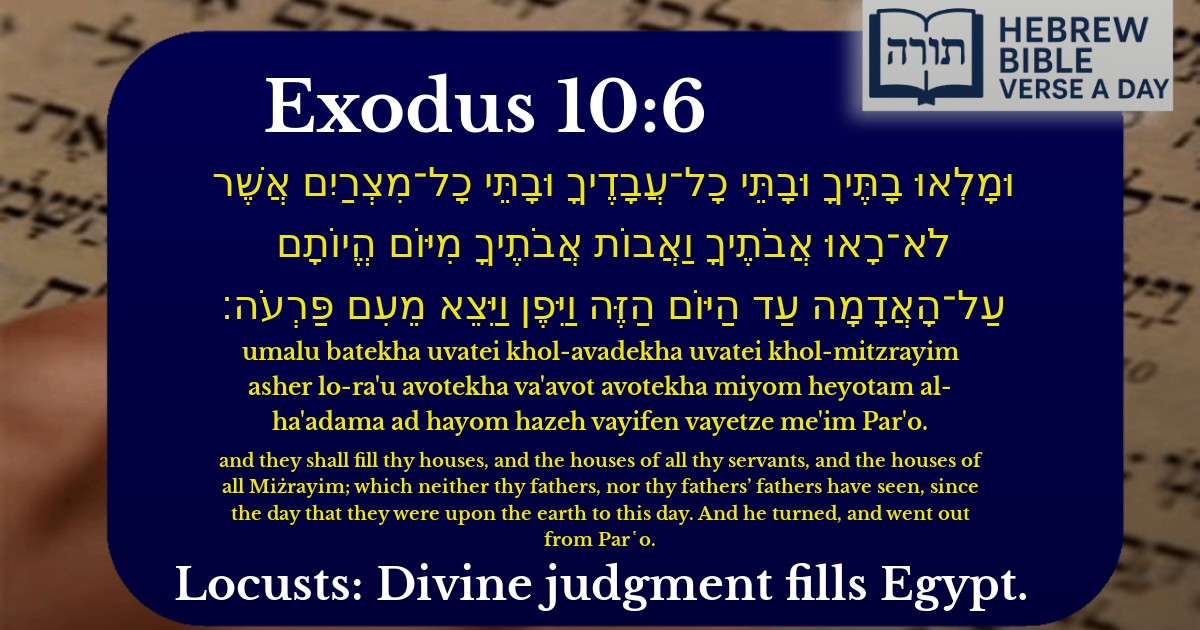Join Our Newsletter To Be Informed When New Videos Are Posted
Join the thousands of fellow Studends who rely on our videos to learn how to read the bible in Hebrew for free!
Hebrew Text
וּמָלְאוּ בָתֶּיךָ וּבָתֵּי כָל־עֲבָדֶיךָ וּבָתֵּי כָל־מִצְרַיִם אֲשֶׁר לֹא־רָאוּ אֲבֹתֶיךָ וַאֲבוֹת אֲבֹתֶיךָ מִיּוֹם הֱיוֹתָם עַל־הָאֲדָמָה עַד הַיּוֹם הַזֶּה וַיִּפֶן וַיֵּצֵא מֵעִם פַּרְעֹה׃
English Translation
and they shall fill thy houses, and the houses of all thy servants, and the houses of all Miżrayim; which neither thy fathers, nor thy fathers’ fathers have seen, since the day that they were upon the earth to this day. And he turned, and went out from Par῾o.
Transliteration
Umalu batekha uvatei khol-avadekha uvatei khol-mitzrayim asher lo-ra'u avotekha va'avot avotekha miyom heyotam al-ha'adama ad hayom hazeh vayifen vayetze me'im Par'o.
Hebrew Leining Text
וּמָלְא֨וּ בָתֶּ֜יךָ וּבָתֵּ֣י כׇל־עֲבָדֶ֘יךָ֮ וּבָתֵּ֣י כׇל־מִצְרַ֒יִם֒ אֲשֶׁ֨ר לֹֽא־רָא֤וּ אֲבֹתֶ֙יךָ֙ וַאֲב֣וֹת אֲבֹתֶ֔יךָ מִיּ֗וֹם הֱיוֹתָם֙ עַל־הָ֣אֲדָמָ֔ה עַ֖ד הַיּ֣וֹם הַזֶּ֑ה וַיִּ֥פֶן וַיֵּצֵ֖א מֵעִ֥ם פַּרְעֹֽה׃
וּמָלְא֨וּ בָתֶּ֜יךָ וּבָתֵּ֣י כׇל־עֲבָדֶ֘יךָ֮ וּבָתֵּ֣י כׇל־מִצְרַ֒יִם֒ אֲשֶׁ֨ר לֹֽא־רָא֤וּ אֲבֹתֶ֙יךָ֙ וַאֲב֣וֹת אֲבֹתֶ֔יךָ מִיּ֗וֹם הֱיוֹתָם֙ עַל־הָ֣אֲדָמָ֔ה עַ֖ד הַיּ֣וֹם הַזֶּ֑ה וַיִּ֥פֶן וַיֵּצֵ֖א מֵעִ֥ם פַּרְעֹֽה׃
🎵 Listen to leining
Parasha Commentary
📚 Talmud Citations
This verse is not quoted in the Talmud.


Context of the Verse
This verse (Shemot 10:6) is part of Moshe's warning to Pharaoh about the impending plague of locusts. The verse describes the severity of the plague, emphasizing that it will be unprecedented in Egyptian history, filling the houses of Pharaoh, his servants, and all of Egypt.
Rashi's Commentary
Rashi explains that the phrase "which neither thy fathers, nor thy fathers’ fathers have seen" underscores the unprecedented nature of the locust plague. He notes that this was not merely a natural occurrence but a divinely orchestrated event, demonstrating Hashem's power over creation. Rashi also highlights Moshe's boldness in speaking to Pharaoh and then turning away without waiting for a response, showing his confidence in Hashem's word.
Ibn Ezra's Insight
Ibn Ezra focuses on the phrase "since the day that they were upon the earth to this day", interpreting it as a hyperbolic expression to emphasize the unparalleled severity of the plague. He suggests that while locusts were known in Egypt, this infestation would be of such magnitude that it would surpass all previous experiences.
Midrashic Interpretation
The Midrash (Shemot Rabbah 13:7) elaborates on the phrase "and they shall fill thy houses", teaching that the locusts would invade even the most secure and protected spaces, including Pharaoh's palace. This was a direct challenge to Pharaoh's arrogance, as it showed that no human power could prevent Hashem's decree.
Rambam's Perspective
Rambam (Hilchot Teshuvah 6:5) uses this verse to illustrate the concept of divine punishment being measure-for-measure. The Egyptians oppressed Bnei Yisrael by forcing them to labor excessively, and now their homes would be overrun by locusts, disrupting their lives in a similar manner. This reinforces the principle that Hashem's justice is precise and retributive.